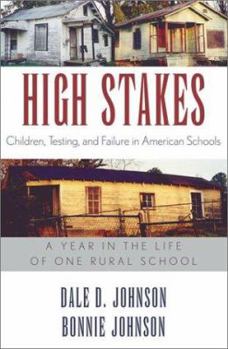High Stakes: Children, Testing, and Failure in American Schools
Select Format
Select Condition 
Book Overview
High Stakes Testing, Poverty, and Failure in American Schools is a critical ethnography of one year in one of the most impoverished schools in America. Redbud Elementary School in Redbud, Louisiana has 611 students, 95 percent of whom qualify for free breakfast and free lunch. Many of the children who attend Redbud are the poorest of the poor. Their homes are substandard and include trailers, shotgun houses, and housing project apartments. Some lack electricity, running water, and flooring. Most of the children, 80 percent of whom are African American, live with a single parent, an aunt, or a grandmother who hold minimum-wage jobs. Many of the children do not receive medical or dental care. Their neighborhoods teem with alcohol and drug abuse. Several pupils have witnessed shootings and other types of violence. Louisiana was the first state and is now one of eight states in the nation that mandates failure and grade repetition for elementary and middle school students who do not pass an end-of-year high stakes test. The authors taught third and fourth grade full time for one school year at Redbud Elementary, and this book tells the story of that year. Three major themes are addressed throughout the book: the grinding effects of acute poverty on all aspects of life, the negative consequences of the continuing drive for higher test scores in public schools, and the unreasonable demands placed on children, teachers, and administrators. Other issues surface in the book: the rising growth of for-profit ventures feeding off the accountability movement, the developing alliances between policymakers and corporate profiteers, and the federal government's increasing domination of public schooling. Readers may note similarities between Redbud Elementary and underfunded public schools in their own states. The story of Louisiana's Redbud typifies the unfolding national tragedy in the way poor children are being 'educated' because of self-serving political and corporate interests.
Format:Paperback
Language:English
ISBN:0742517896
ISBN13:9780742517899
Release Date:May 2002
Publisher:Rowman & Littlefield Publishers
Length:240 Pages
Weight:0.75 lbs.
Dimensions:9.0" x 1.1" x 5.8"
Customer Reviews
1 rating
A second look at standardized testing
Published by Thriftbooks.com User , 22 years ago
Increasingly since the early 1980's, standardized testing has been appropriated not as a general measure of institutional comparision, but punnitative measures towards students who can't quite measure up. Using a case study in Lousianna, Johnson and Johnson demonstrate standardized testing sounds great in political propaganda (what individual wants to be against academic excellence?) but implementation is sharply at odds with the complex reality of learning styles and economic limitations. Because standardized tests rely on rote memorization and repition of facts in a multiple choice format, they are not the best format for people who have other learning styles. Additionally, different groups of students are educationally tracked (advanced placement, special education) but this system and it's real effects on the individual student are too convienently downplayed during test administration time. The tests real function is to ultimately provide quickie reassurance to elected officials and parents alike that their communities are 'smart' while continuing to avoid and/or underaddress the curricular and economic issues which would actually enable these students to succed on the same programs.





